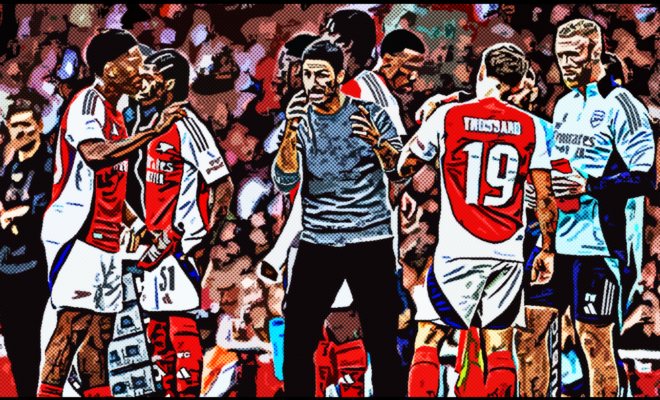Mikel Arteta: More Than a Guardiola Disciple

Mikel Arteta’s managerial journey has often been discussed in the shadow of his mentor, Pep Guardiola. After working under Guardiola at Manchester City, it seemed inevitable that Arteta would follow a similar tactical path, emphasizing possession-based football and rigid positional play. However, as his time at Arsenal has progressed, Arteta’s evolution as a coach is proving that he is much more than a Guardiola disciple. Drawing from influences such as Arsène Wenger, Brazilian relationism, and a pragmatic English footballing approach, Arteta has built a team defined by adaptability, creativity, physicality, and defensive resilience—showing that he is carving out a philosophy that is distinctly his own.
The Wenger Influence: Rebuilding the Arsenal Family
When Arteta took over Arsenal in 2019, one of his first goals was to rebuild the cultural foundation Wenger had established—a family-like atmosphere that emphasized unity both on and off the pitch. Wenger’s teams, especially in their prime, played with fluidity and freedom, relying on the relationships between players and their ability to understand each other’s movements. Under Wenger, football was not just a technical exercise but a form of expression.
Arteta has modernized this approach by combining Wenger’s relationship-based football with more tactical discipline. In the 2-2 draw with Tottenham in September 2023, this was evident through the interplay between Martin Ødegaard and Bukayo Saka. Ødegaard frequently dropped deep to link play, allowing Saka to drift into central spaces and attack Tottenham’s defense from unpredictable angles. This kind of movement, reminiscent of Wenger’s more free-flowing sides, has been reworked under Arteta with a stronger emphasis on maintaining team shape and defensive balance.
While Wenger’s teams were often accused of being too open defensively, Arteta has ensured that his side remains disciplined even while offering players the freedom to express themselves. This blend of Wenger’s ideals with modern defensive structure is what sets Arteta apart from his former mentor and many of his contemporaries.
Brazilian Relationism: Freedom Within Structure
One of the core elements of Arteta’s philosophy is his use of Brazilian relationism, a tactical concept that emphasizes the relationships between players within a flexible framework. Unlike Guardiola’s more rigid positional play, relationism allows players to rotate and improvise within the structure, providing creative freedom as long as overall balance is maintained.
A great example of this came during Arsenal’s 4-0 win over Bournemouth in September 2023. In that match, Oleksandr Zinchenko, the left-back, frequently moved into midfield during Arsenal’s buildup, allowing Declan Rice to push higher up the pitch. This rotation allowed Arsenal to dominate the central areas, with Gabriel Jesus dropping deep to link play and Martinelli exploiting the space created on the left flank. This kind of fluid movement kept Bournemouth’s defense on the back foot and allowed Arsenal to control the game.
Fabio Vieira and Martin Ødegaard represent relationism perfectly within Arteta’s side. Vieira’s ability to float between lines, acting as a creator and connector, complements Ødegaard’s positional freedom. Their movement makes Arsenal difficult to defend against, as the duo can disrupt defensive shapes and create overloads in key areas. This fluidity within a structured system is something Arteta has emphasized, differentiating himself from Guardiola, whose sides often prioritize positional rigidity.
Physicality and English Pragmatism: Building a Resilient Core
One of the most significant ways Arteta has diverged from Guardiola—and even from Wenger—is in his emphasis on physicality. Arteta has recognized that to compete in the modern Premier League, Arsenal needs to be more than just a technically gifted team. He has deliberately sought out players who bring physical strength, resilience, and a willingness to fight through 90 minutes. This philosophy has seen Arteta prioritize physicality over raw pace or trickery in certain positions, bringing in “bulldogs” who will fight for every ball and see out results in tough situations.
Players like Declan Rice, Jurrien Timber, and Gabriel Magalhães epitomize this shift. Rice’s signing in the summer of 2023 wasn’t just about adding another ball-playing midfielder; it was about adding steel to the midfield. Rice’s work rate, tackling, and ability to read the game provide Arsenal with a physical and defensive presence in the middle of the park. His performance in Arsenal’s 1-0 victory over Manchester City in October 2023 highlighted this perfectly—while City had the lion’s share of possession, Rice’s ability to disrupt their attacks and provide cover for the defense was crucial to Arsenal’s win.
Jurrien Timber and Gabriel Magalhães were also recruited with this physical profile in mind. Timber, versatile and athletic, is comfortable in multiple defensive roles, while Gabriel brings strength and leadership to the backline. This focus on physicality has added a dimension to Arsenal’s play that was missing in previous seasons, giving them the ability to grind out results when their technical football isn’t enough.
Guardiola’s Influence and Tactical Flexibility
It would be an oversimplification to suggest that Guardiola does not use similar tactical tools, such as inverted full-backs. In fact, Guardiola has increasingly allowed players like João Cancelo to invert into midfield in recent years, demonstrating more flexibility than earlier in his career. However, the key difference between Guardiola and Arteta lies in how far each is willing to allow tactical fluidity to break from the system.
In Guardiola’s Manchester City, positional play remains the cornerstone, with players sticking to defined roles within the system, even when adapting to the game’s demands. Arteta, on the other hand, allows more room for fluidity. In Arsenal’s 4-0 win over PSV Eindhoven in September 2023, Zinchenko’s constant inversion into midfield was complemented by Declan Rice’s advanced positioning, which completely disrupted PSV’s defensive structure. This willingness to compromise positional play in moments to press an advantage is something that Arteta embraces more readily than Guardiola.
This tactical flexibility makes Arsenal a more unpredictable side, allowing them to adapt to different opponents and game situations. Guardiola’s City, while dominant, often relies on their system’s ability to outplay opponents over the course of 90 minutes. Arteta’s Arsenal, by contrast, is built to exploit specific weaknesses at crucial moments, using a blend of technical quality, relationism, and physicality.
A Balanced Arsenal: Style Meets Substance
Arteta’s Arsenal is defined by its balance—capable of playing fluid, attacking football while also possessing the physical and tactical robustness to sit deep and defend when needed. This ability to adapt to the game’s flow was on full display in Arsenal’s 2-1 win over Chelsea in October 2024, where Arsenal struggled to break Chelsea down in the first half. After halftime, Arteta made key adjustments, instructing his players to press more aggressively and play with greater intensity. This shift forced Chelsea into mistakes, allowing Arsenal to take control of the game.
The combination of physicality, tactical fluidity, and a willingness to adapt during matches has allowed Arsenal to become a more resilient and versatile team. Arteta’s approach contrasts sharply with Guardiola’s, whose City sides tend to dominate possession and stick to their tactical identity throughout a match.
The Final Whistle: Arteta’s Arsenal, His Own Creation
Mikel Arteta is no longer simply seen as Guardiola’s apprentice. While Guardiola’s influence is clear, Arteta has built a team that reflects his own ideas, combining Wenger’s family ethos, Brazilian relationism, and English pragmatism with a heavy emphasis on physicality. His willingness to recruit players who can outfight and outlast opponents—while allowing creative players the freedom to move and exploit space—has made Arsenal a uniquely dangerous side in both the Premier League and Europe.
As Arsenal continues its push for silverware, Arteta’s blend of technical quality, tactical flexibility, and physical resilience will be key. His ability to balance style and substance—adapting to different situations without compromising on either—is what makes Arteta’s Arsenal his own creation, and one built to compete for years to come.


